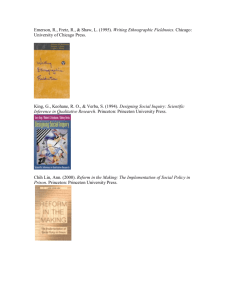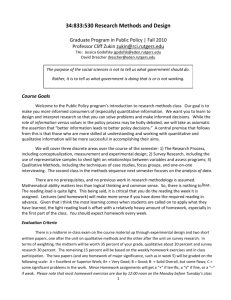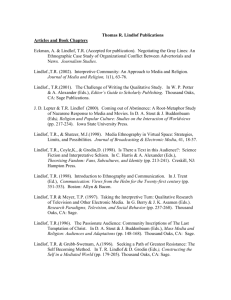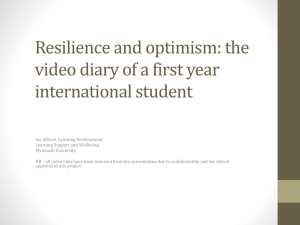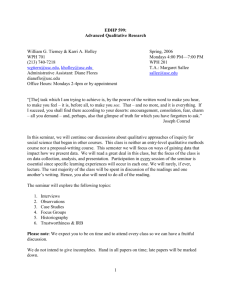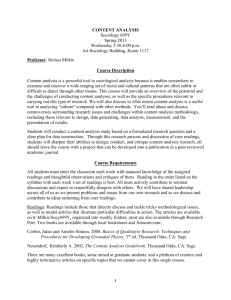SWRK 261
advertisement
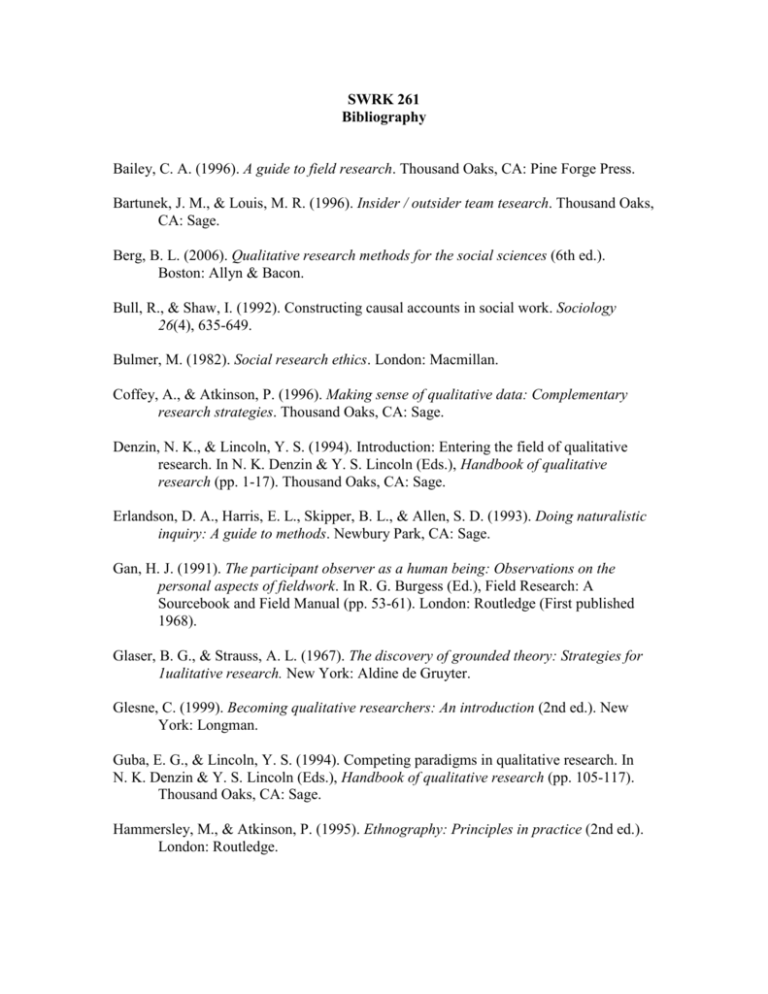
SWRK 261 Bibliography Bailey, C. A. (1996). A guide to field research. Thousand Oaks, CA: Pine Forge Press. Bartunek, J. M., & Louis, M. R. (1996). Insider / outsider team tesearch. Thousand Oaks, CA: Sage. Berg, B. L. (2006). Qualitative research methods for the social sciences (6th ed.). Boston: Allyn & Bacon. Bull, R., & Shaw, I. (1992). Constructing causal accounts in social work. Sociology 26(4), 635-649. Bulmer, M. (1982). Social research ethics. London: Macmillan. Coffey, A., & Atkinson, P. (1996). Making sense of qualitative data: Complementary research strategies. Thousand Oaks, CA: Sage. Denzin, N. K., & Lincoln, Y. S. (1994). Introduction: Entering the field of qualitative research. In N. K. Denzin & Y. S. Lincoln (Eds.), Handbook of qualitative research (pp. 1-17). Thousand Oaks, CA: Sage. Erlandson, D. A., Harris, E. L., Skipper, B. L., & Allen, S. D. (1993). Doing naturalistic inquiry: A guide to methods. Newbury Park, CA: Sage. Gan, H. J. (1991). The participant observer as a human being: Observations on the personal aspects of fieldwork. In R. G. Burgess (Ed.), Field Research: A Sourcebook and Field Manual (pp. 53-61). London: Routledge (First published 1968). Glaser, B. G., & Strauss, A. L. (1967). The discovery of grounded theory: Strategies for 1ualitative research. New York: Aldine de Gruyter. Glesne, C. (1999). Becoming qualitative researchers: An introduction (2nd ed.). New York: Longman. Guba, E. G., & Lincoln, Y. S. (1994). Competing paradigms in qualitative research. In N. K. Denzin & Y. S. Lincoln (Eds.), Handbook of qualitative research (pp. 105-117). Thousand Oaks, CA: Sage. Hammersley, M., & Atkinson, P. (1995). Ethnography: Principles in practice (2nd ed.). London: Routledge. Kirk, J., & Miller, M. L. (1986). Reliability and validity in qualitative research. Newbury Park, CA: Sage. Lincoln, Y., & Guba, E. (1986). But is it rigorous? Trustworthiness and authenticity in naturalistic evaluation. In D. D. Williams (Ed.), Naturalistic evaluation. New directions in program evaluation, No. 30, San Francisco: Jossey-Bass. Lincoln, Y., & Guba, E. (1989). Ethics: the failure of positivist science. Review of Higher Education 12(3), 221-240. Lincoln, Y., & Guba, E. G. (1985). Naturalistic inquiry. Newbury Park, CA: Sage. Miles, M. B., & Huberman, A. M. (1994). Qualitative data analysis: An expanded sourcebook (2nd ed.). Thousand Oaks, CA: Sage. Morgan, D. L., & Krueger, R. A. (1997). Focus group kit (Vols. 1-6). Thousand Oaks, CA: Sage. Patton, M. Q. (2001). Qualitative evaluation and research methods (3rd ed.). Newbury Park, CA: Sage. Rogers, G., & Bouey, E. (1996). Collecting your data. In L. M. Tutty, M. Rothery, R. M. Grinnell, Jr. (Eds.), Qualitative research for social workers: Phases, steps, and tasks (4th ed.), (pp. 50-87). Boston: Ally & Bacon. Schwandt, T. A. (1997). Qualitative inquiry: A dictionary of terms. Thousand Oaks, CA: Sage. Shaw, I., & Shaw, A. (1997). Keeping social work honest: Evaluating as profession and practice. British Journal of Social Work 27(6), 847-869. Spradley, J. (1979). The ethnographic interview. Orlando, FL: Harcourt Brace Jovanovich. Strauss, A., & Corbin, J. (1998). Basics of qualitative research: Techniques and Procedures for Developing Grounded Theory (2nd ed.). Thousand Oaks, CA: Sage. Weiss, R. S. (1994). Learning from strangers: The art and method of qualitative interview studies. New York: The Free Press.



